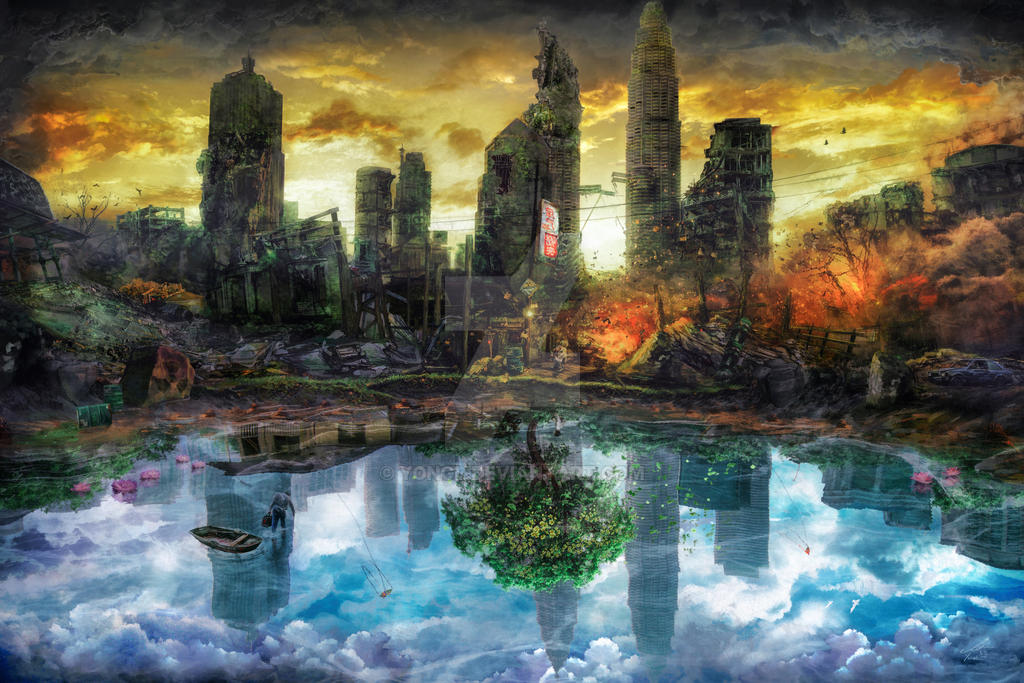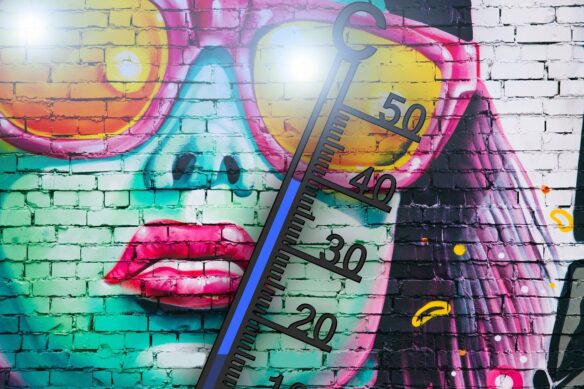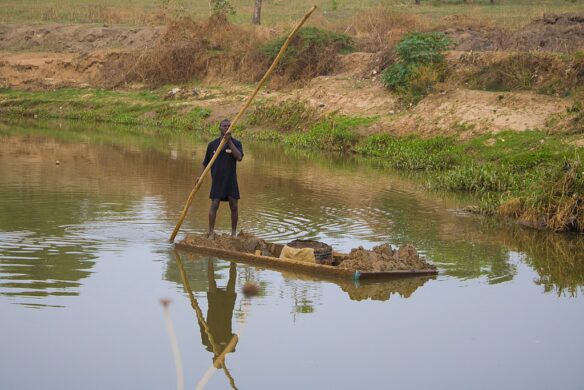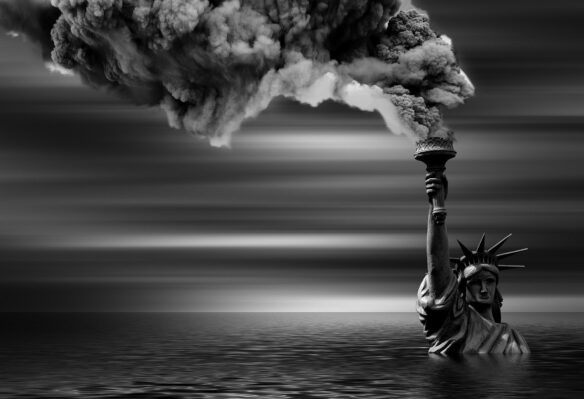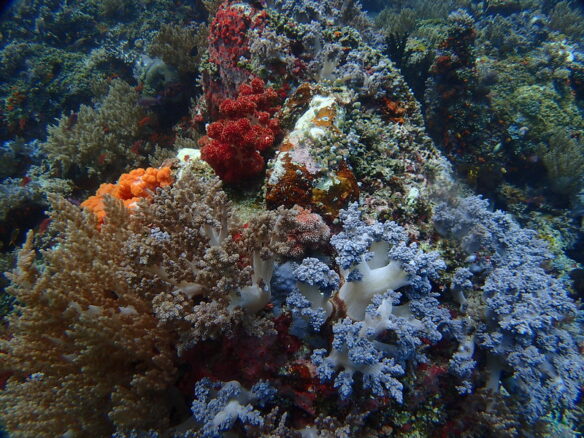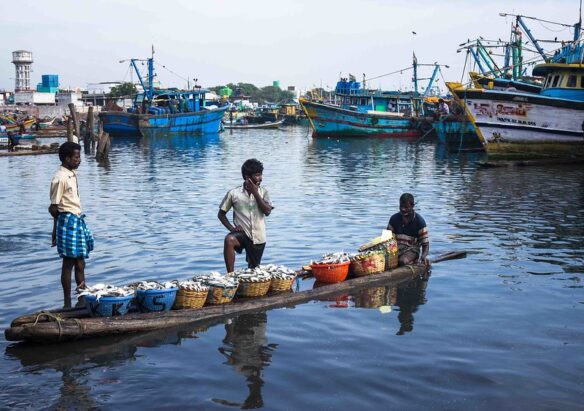Excerpt:
Imagine 2200, Grist’s climate fiction contest, celebrates stories that offer vivid, hope-filled, diverse visions of climate progress.
This is Grist’s third yearpublishing an Imagine 2200 climate fiction contest. Each year, as we prepare to release 12 new stories depicting hopeful, intersectional climate futures, I find myself thinking back on what this initiative has meant to me personally. We hope these stories kick-start readers on a journey of rediscovering hope for what the world could be, and jump-starting imaginations about what our future could look like. For me, that journey has been profound.
When I first started working on Imagine 2200, back in 2020, I was skeptical of the value of hopeful stories. After all, the seeds of this initiative were taking root at the beginning of the pandemic, in the middle of the rise of far-right extremism, and during an uprising that was challenging systemic racism. Things felt bleak. Here I had been charged with developing and leading an initiative grounded in hope and solutions, but I myself was angry, slightly depressed, and starting to believe that we are all doomed.
Through working at Grist I started to read, discuss, and be in community with folk who were reporting on people working to build a better future. They had hope, they were invested in solutions, and they were pushing back against the status quo. Grist’s reporting and focus on climate, justice, and solutions became sort of a balm. Something in me took root. I started to find my old self. I realized that hopeful stories are not about ignoring the problems we face. Instead, they are about imagining a better future, and giving us the courage to fight for it…
During the pandemic I sought out work by Afrofuturists, Indigenous futurists, Latinx futurists, Asian futurists, disabled futurists, feminist futurists, queer futurists, hopepunks, and solarpunks. These movements are creating stories that imagine futures free from oppression, extraction, and colonial systems of harm, and often the most potent weapon the characters in these stories have is their community and hope. These movements and genres offered me a glimpse of a better future, and helped me find the part of myself that was slipping away and turning toward pessimism and darkness.
We are not doomed. It’s fatalistic to think so. It is not too late for our species and all the other creatures on Earth. There is still a chance to avert the worst effects of climate change if we take action now, and climate fiction and climate storytelling are necessary tools in our toolbox of solutions. Humans need stories. Stories are central to building community, communicating, and visioning. Hopeful visions and narratives of the future help motivate us to take action and build a better future.
These are the values that guided Imagine 2200, and that keep driving the contest each year…
The 2024 Imagine contest collection
First Place Winner
Second Place Winner
Third Place Winner
To Labor for the Hive – Jamie Liu
A beekeeper finds a new sense of purpose and community after helping to develop a warning system for floods.
The Last Almond – Zoe Young
As California prepares to destroy a levee and sacrifice its last remaining almond farm, its caretaker remembers the toll floodwaters have taken on his family.
A Seder in Siberia – Louis Evans
The arrival of a surprise visitor at a family’s Passover celebration reveals the true story of how they came to be climate exiles.
Accensa Domo Proximi – Cameron Neil Ishee
A beekeeper finds a new sense of purpose and community after helping to develop a warning system for floods.
Gifts We Give to the Sea – Dinara Tengri
A mother must come to terms with her child’s identity, her husband’s passing, and the changing landscape of their community.
The Imperfect Blue Marble – Rae Mariz
In a culture where a child’s first word takes on great meaning, a nonverbal child shows his compassion beyond words.
La Sirène – Karen Engelsen
On a submarine housing children born with a genetic mutation, people of faith wrestle with the sin of causing an ecological disaster.
Cabbage Koora: A Prognostic Autobiography – Sanjana Sekhar
Across generations and a changing world, an Indian family preserves its traditions through food, dance, and the latest communication fads.
The Long In-Between – Andrew Kenneson
A father’s effort to honor his daughter’s memory through a rewilding project collides with his neighbor’s conventional farming practices.
A Gift of Coconuts – Melissa Gunn
A family races against time to prepare their coconut farm for a massive storm surge.
Stasis – Lovinia Summer
A desert dweller undergoes a rapid and enlightening metamorphosis to survive the seasonal migration.
The Blossoming – Guglielmo Miccolupi and Laura C Zanetti-Domingues
A student seeking his purpose in life makes a discovery that could revive a friend’s vital research.
And . . . Previously Published in this Series. . .
Climate Fiction to Imagine a Better World – Grist

Replay Boomer
With climate change making the future look bleak, a father struggles to understand his teen’s participation in a movement of young people intent on reliving the past.
:
1963
Breakfast is interrupted by a crash that shakes the house to its foundations. Out the window, the wet coastal view is obscured by a spray of dust and foam. Another house has slid into the sea.
The silence that floods back in its wake is emptier, the gulls have fled. I wait a minute to see if the drama has roused Nyx, but it is 7 a.m. and she is a teenager, it takes more than the decline of empires to get her up this early. Alone, I step out onto the porch to see the damage.
On our side of Caldwell Street, tight fences enclose narrow two-story townhouses. The remaining houses across the street are shells — condemned and then burnt out by vagrants, eroding into the sea below. A fresh gap has opened up in the row, giving us a view of the rain-speckled waves sucking away tile and plasterboard.
A bell tinkles, drawing my attention to a figure cycling through the long shadows of the condemned homes. She’s a delivery girl, with flat-cap and all, and although it has been at least twenty-five years since the news went online, something in me still responds to the arc of her arm and the thud as a newspaper bounces end-over-end into our porch. Flashbacks to smoothing out the front pages in the dappled sunlight of my parent’s kitchen table. The girl cycles away down the coast road. I rotate the cylinder at my feet with a foot until the masthead comes into view. THE PAST TIMES, bracketed by dodos statant.
“Nyx!” I shout. “It’s for you!”
No reply, unsurprisingly. I hold the bundle to my face and take a nostalgic sniff of newsprint, then deposit it in front of Nyx’s bedroom door, where a poster of a glowering James Dean guards against forceful entry. I return to my breakfast and am scrolling through news about power-failures in India when a scream peals out from upstairs.
Parenting instincts kick in, and I’ve burst past James before I’ve fully registered the situation. Nyx is sitting at the edge of her bed with her arms clasped protectively around her torso. “No, no,” she moans. At her feet is the unfolded PAST TIMES. ‘President’s Death Mourned by World’ reads the headline, above a photograph of the square jaw and Ken-Doll haircut.
Nyx is fourteen, hugging has become complicated. I settle for an awkward arm about her shoulders, side by side so we don’t have to make eye contact. Instead I look around the room — this isn’t a place I’m often allowed these days. Last time I was here there was a bedside table photo frame of Nyx, me, and her mum, but it’s gone now, replaced by a rotary dial phone and a stack of yellow paperbacks with crumbling covers.
Nyx grabs a clunky remote from her bedside table and points it at the boxy screen in the corner. A white line cuts horizontally across the glass then expands into monochrome television footage, darkened at the corners like a fishbowl. A newscaster in a narrow tie is fiddling with his heavy-rimmed glasses as he recounts the news. “ … Dead of an assassin’s bullet, in the 46th year of his life, and in the third year of his, uh, administration as President of the United States.”
“I can’t believe it,” Nyx says, hand over her mouth…
Imagine 2200, Grist’s climate fiction initiative, publishes stories that envision the next 180 years of equitable climate progress, imagining intersectional worlds of abundance, adaptation, reform, and hope.
SHARE THIS ARTICLE
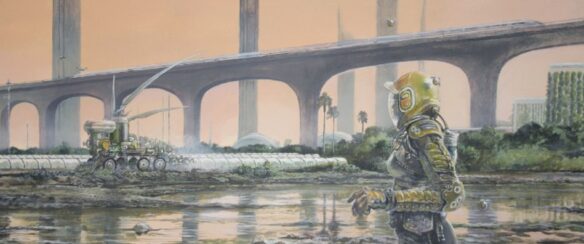
Excerpt:
Immerse yourself in these short audio cli-fi stories, from our Imagine 2200 initiative, and find hope in unexpected places.
Imagine 2200, Grist’s climate fiction initiative, invites readers and writers to envision equitable climate progress in futures near and far.
In this audiobook collection, immerse yourself in readings of some of our favorite tales we’ve published so far. They tell of finding climate solutions in one’s heritage, the connections between species facing extinction, and finding ways to survive through the power of community.
Read the Stories:
Afterglow
(29:17)
By Lindsay Brodeck
As the wealthy flee Earth, a young woman must decide whether to follow her partner to a new world or stay behind to save a dying planet.
The Secrets of the Last Greenland Shark
(30:50)
By Mike McClelland
The last four creatures on Earth make an amazing discovery as the oldest of them finally returns home.
The Cloud Weaver’s Song
(30:02)
By Saul Tanpepper
In a city high above the desert, a dew harvester and her friend sacrifice everything to prove the end of the Great Drying is at hand.
Sweet Water From Salt (34:13)
By Jeremy Pak Nelson
A grieving son protects his family’s beehives as he steers them home aboard his parents’ ship.
The Metamorphosis of Marie Martin (38:00)
By Nadine Tomlinson
A Jamaican woman takes more than she gives, until the sea teaches her a valuable lesson with implications for everyone around her.
And Now the Shade (39:05)
By Rich Larson
A bioengineer grappling with a challenging problem finds the answer in the dreams of her dying grandmother.
Seven Sisters (41:10)
By Susan Kaye Quinn
As hard times and broken bots threaten a collective tea farm, the women keeping it going must decide whether to add another to their ranks.

